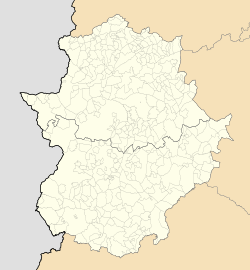world.wikisort.org - Spain
Alburquerque (Spanish pronunciation: [alβuɾˈkeɾke] (![]() listen)) is a town in the province of Badajoz in Spain. It has 5,600 inhabitants. It is very close to the border with Portugal and was an ancient dominion of the kings of that country. The origin of the name of the town is uncertain. It is believed to stem from Latin alba quercus "the white oak".[2]
listen)) is a town in the province of Badajoz in Spain. It has 5,600 inhabitants. It is very close to the border with Portugal and was an ancient dominion of the kings of that country. The origin of the name of the town is uncertain. It is believed to stem from Latin alba quercus "the white oak".[2]
This article needs additional citations for verification. (May 2013) |
Alburquerque | |
|---|---|
Municipality | |
 The town as seen from its castle in 2005 | |
 Alburquerque Location of Alburquerque within Extremadura  Alburquerque Alburquerque (Spain) | |
| Coordinates: 39°13′9″N 7°00′4″W | |
| Country | Spain |
| Autonomous Community | Extremadura |
| Province | Badajoz |
| Government | |
| • Mayor | Ángel Vadillo Espino (PSOE) |
| Area | |
| • Total | 723 km2 (279 sq mi) |
| Elevation (AMSL) | 506 m (1,660 ft) |
| Population (2018)[1] | |
| • Total | 5,340 |
| • Density | 7.4/km2 (19/sq mi) |
| Time zone | UTC+1 (CET) |
| • Summer (DST) | UTC+2 (CEST (GMT +2)) |
| Postal code | 06510 |
| Area code(s) | +34 (Spain) + 924 (Badajoz) |
| Website | www |
The titles of Lord of Alburquerque (de Meneses) and later Count of Alburquerque (de Castilla) and Duke of Alburquerque (de La Cueva) were important in Castile in the Middle Ages, see e.g. Sancho Alfonso, 1st Count of Alburquerque.
Its sister city of Albuquerque in the United States takes its name from this town (but note the spelling difference: the lack of the 'r' after the first 'u').
History

By 1530, the town had a population of 6,042, increasing up to 6,893 by the end of the century (1591) and to 7,600 in 1631.[3]
References
- Citations
- Municipal Register of Spain 2018. National Statistics Institute.
- "Albuquerque". Online Etymology Dictionary. Retrieved 23 April 2013.
- Blanco Carrasco 1998, pp. 90–91, 97.
- Bibliography
- Blanco Carrasco, José Pablo (1998). "Las ciudades extremeñas en tiempos de Felipe II. Problemas fiscales y demográficos" (PDF). Congreso Internacional Felipe II (1527-1598): Europa y la monarquía católica. Vol. 2. Madrid: Parteluz. pp. 89–102 – via Universidad Autónoma de Madrid.
На других языках
- [en] Alburquerque, Spain
[es] Alburquerque
Alburquerque es un municipio español, perteneciente a la provincia de Badajoz (comunidad autónoma de Extremadura).[ru] Альбуркерке
Альбуркерке (исп. Alburquerque) — город и муниципалитет в Испании, входит в провинцию Бадахос в составе автономного сообщества Эстремадура. Муниципалитет находится в составе района (комарки) Лос-Бальдиос. Население — 5678 человек (на 2010 год). Расстояние до административного центра провинции — 45 км.Другой контент может иметь иную лицензию. Перед использованием материалов сайта WikiSort.org внимательно изучите правила лицензирования конкретных элементов наполнения сайта.
WikiSort.org - проект по пересортировке и дополнению контента Википедии

